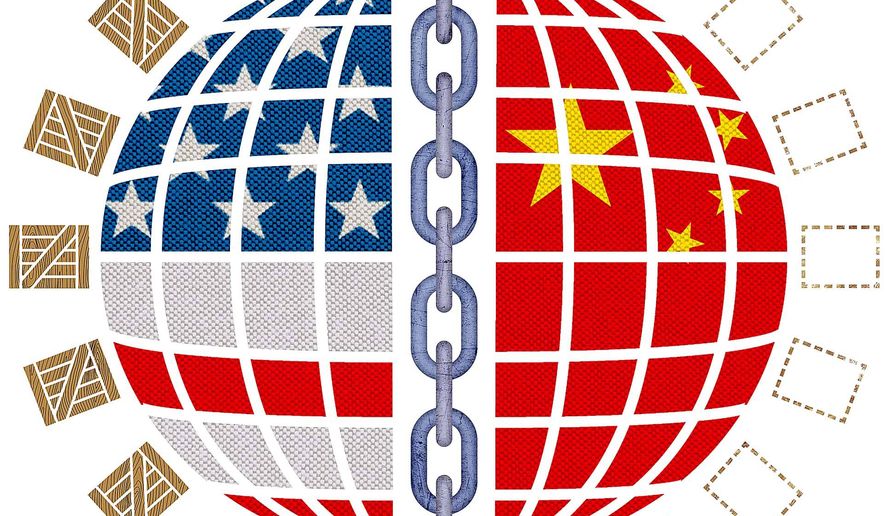By Peter Morici
 It may be tough for Americans to accept but cheap toasters and TVs from China come at a terrible risk of lost freedom, because Beijing is using the cash it earns from those purchases in a new cold war aimed at replacing the United States as the pre-eminent global superpower.
It may be tough for Americans to accept but cheap toasters and TVs from China come at a terrible risk of lost freedom, because Beijing is using the cash it earns from those purchases in a new cold war aimed at replacing the United States as the pre-eminent global superpower.
The contest is waged in four theaters — the Korean Peninsula, the South China Sea, and broader Pacific and Indian Oceans, the race for dominance in artificial intelligence and most importantly, the standoff over trade.
Presidents Clinton, Bush and Obama appeased Beijing by letting it enable, effectively unchallenged, North Korea’s nuclear weapons and missile programs — those have advanced to pose a direct threat to the U.S. mainland. President Trump has responded by coordinating truly meaningful international sanctions, but those are not enough without Beijing earnestly turning the screws on Pyongyang.
Mr. Trump brags about his great relationships with President Xi, but he is happy to watch President Kim Jong-un slow walk the den-uclearization required by the recent U.S.-North Korean framework agreement. Both know they can wait out Mr. Trump, because it would be tough for the United States to take military action with South Korea so eager for more normal relations with its northern neighbor.
In the South China Sea, Beijing’s forces have taken possession, expanded and militarized islands in international waters, impaired freedom of navigation and violated the sovereignty of neighbors. It is building a navy to challenge American sea power that shakes confidence among our Southeast Asian friends, has established a naval base on the horn of Africa and has taken possession of a vital port in Sri Lanka.
With the Belt and Road Initiative, China is financing a network of ports and rail connections stretching from China to Europe, and duping developing nations, like Sri Lanka, into debt servitude.
All of this takes hundreds of billions of dollars to buy, develop and as necessary steal Western technology and hardware ranging from port cranes to fighter aircraft to artificial intelligence-enabled software. It’s all financed by China’s elaborate trade and industrial policies designed to foster huge surpluses with the United States.
The litany is well known. China closes its markets to competitive U.S. products with high tariffs and administrative barriers. American companies seeking to produce directly in China must hand over technology and participate directly in the Communist Party’s propaganda campaigns in the United States.
Firms like Marriot, Apple and Google if it wishes to return to the Middle Kingdom must recognize Taiwan as province of China, abstain from any criticism of Beijing’s manifest human rights violations, enforce Beijing’s Great Fire Wall and help enable its population control systems. Now Google is even balking at assisting the Pentagon with artificial intelligence technologies.
China is pouring hundreds of billions of dollars into accomplishing dominance in artificial intelligence — a technological eco-system that will be analog in this century to what water power and mechanized mills were in the 19th century and electrification and assembly line were in the early 20th century.
Mastery of those established British and then American industrial dominance and provided the wealth for strong armies and navies. Now Beijing is outspending America, out-thinking the bureaucracy in Washington and exploiting American apathy.
Recent polls show Americans don’t see China as a threat. And that goes a long way toward explaining why health care mattered so much in the midterms, national security was hardly mentioned and Mr. Trump’s tariffs, if anything, were a liability to Republicans.
Yet, trade is the linchpin of China’s strategy. Without the $360 billion bilateral trade surplus, China simply would not have the cash to finance all these adventures and projects. It can’t print yuan because its own citizens don’t want to hold their currency — once they have made their money they invest it here.
Mr. Trump’s Treasury secretary, Steven Mnunchin, and White House Chief Economist Kevin Hassett don’t see trade deficits that permit Beijing to bully America as a huge problem and counsel more negotiations.
These problems can’t be talked away any more than Hitler’s ambitions were neutralized by Chamberlain’s appeasement. Short of a hot war, across-the-board tariffs — not the weak selective kind so far put in place — or a system of quotas that absolutely balances trade with China are essential to starving for cash the Chinese juggernaut.
• Peter Morici is an economist and business professor at the University of Maryland, and a national columnist.
No comments:
Post a Comment